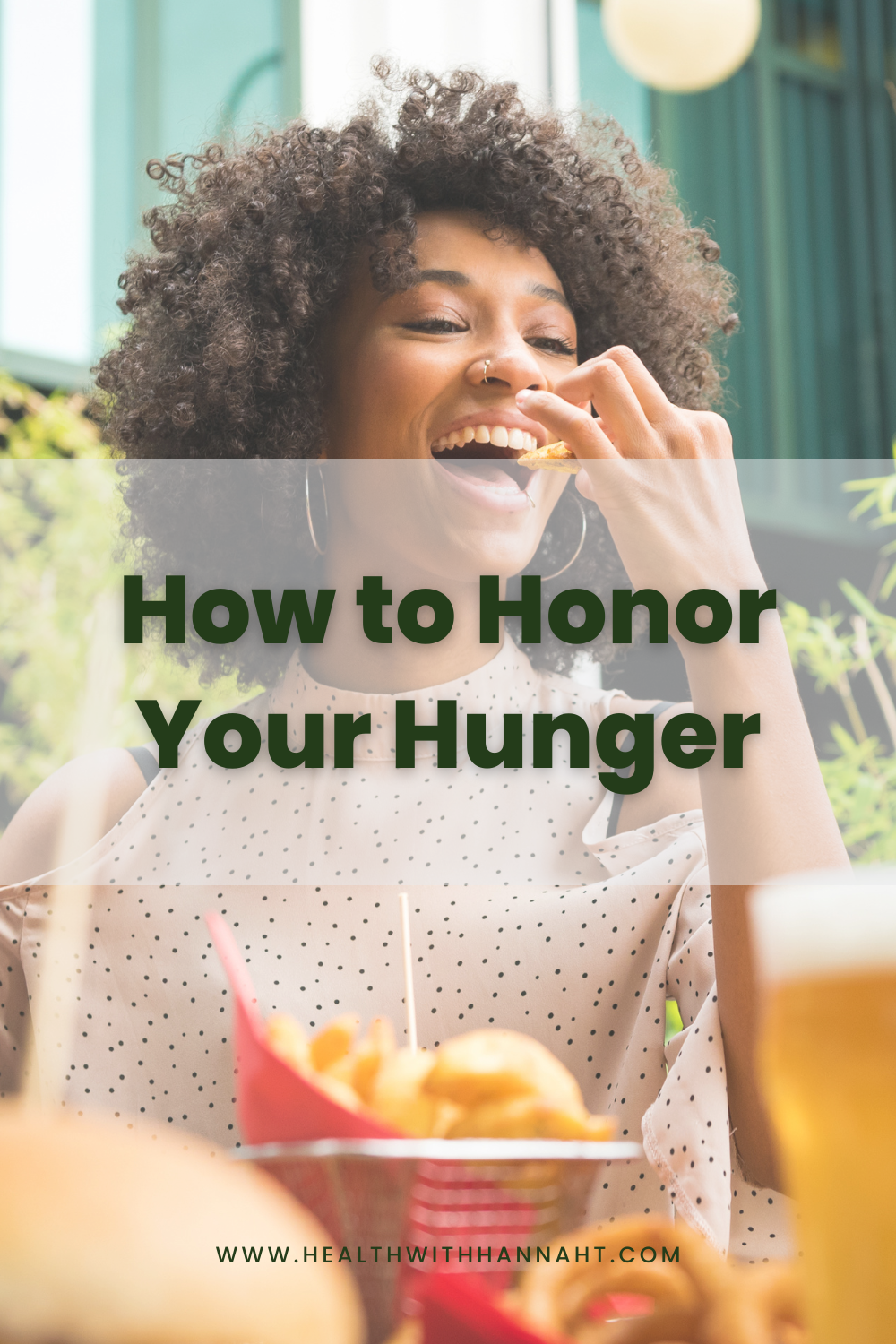How to Honor Your Hunger
There are ten principles of Intuitive Eating, the first being “Reject the Diet Mentality” (check out this blog post all about it). The second principle is “Honor Your Hunger”.
Honoring your hunger and feeling your fullness are the backbones of Intuitive Eating. While there are many moving pieces (as we’ll discuss in this post), learning what your hunger cues are and how to honor them will be key for maintaining a non-diet approach to eating.
If you’re new here, hello and welcome! My name is Hannah and I am a non-diet dietitian here to help you improve your relationship with your food and finally find food freedom.
A dieting body is a starving body
When you go on a diet, your body is not sure if you are doing it for the sake of "health" or because you are stranded on an island and living in a famine state. Our need for energy is primal - if we don't eat enough, our body compensates with biological and psychological mechanisms.
Decreased metabolic rate
Obsession and preoccupation with food
Irritability, moodiness, brain fog
Difficulty to stop eating and binge eating
The fear of feeling hunger
Food insecurity and food scarcity are forms of trauma. Bulimia nervosa and binge eating are increased in individuals with a history of food insecurity. While dieting is not as traumatic of an event as food insecurity, the consequences are similar, especially if you have been dieting since you were a child.
Whether a result of dieting or food scarcity, extreme hunger can feel scary and lead to out-of-control-eating. This often results in individuals being unable to experience and honor gentle biological hunger.
The mechanisms of hunger
Food is an essential requirement for survival. If we don't eat enough, our biology will respond so that we do. When you diet and feel hunger, it is not a "lack of willpower". It is a biological drive to protect you.
The brain monitors the energy needs of the body. It will send signals to tell us what types of foods and how much food it needs. Our body is the OG "calorie counter". It will regulate its energy needs on its own and tell you when and how much to eat to keep this energy in balance. MyFitnessPal could never know your body like that.
When cells need energy, they will produce a signal that induces hunger. This might feel like stomach growling, inability to focus on tasks in the moment, irritability/hanger, etc. Cells primarily get their energy from carbohydrates, but protein and fats also factor into the equation. All macronutrients provide calories that eventually end up as ATP (the cell's energy source).
Don't second-guess your biology! You may feel hungrier sooner than expected. You may have days where you feel hungrier than you typically do. You may ask yourself if you deserve to eat (You do! You never have to earn food).
Reasons why your hunger is silenced
If you are someone who feels like you don’t know what your hunger feels like or you just don’t seem to have any hunger cues, there is likely a reason for that.
Numbing: averting hunger pangs using calorie-free beverages or low calorie foods temporarily tricks the stomach into a sense of fullness.
Dieting: it becomes easy to tune out hunger after chronically dieting. Eventually, after being ignored long enough, the hunger cues stop.
Chaos: if you are constantly busy with life, it can be easy to suppress or ignore hunger.
Stress: the biological response of stress can blunt the sense of hunger.
Trauma history: you need to feel safe in order to feel hungry.
Skipping meals: skipping meals because it "makes you feel hungrier" always backfires.
Not meeting basic needs: if you are not getting enough sleep or time to recharge, this can disrupt connection to your body.
Here’s the good news - you can get these hunger cues back!
How to honor biological hunger
Identify your hunger cues
This might seem silly, but in order to know what your hunger cues are, you need to start listening - it is hard to hear your hunger if you aren't listening for it.
Different people have different cues, such as:
Stomach growls/gurgles
Lightheadedness
Irritability (hanger)
Brain fog/difficulty concentrating
Headache
Feeling faint
Uncomfortable stomach pain
Timing of hunger will ebb and flow, but generally it is best to go no longer than 5 waking hours without nourishment. Those who go longer without eating (besides while sleeping) tend to overeat at next eating opportunity.
Think about it this way - if you hold your breath for a long time, do you just go back to normal breathing right away? No, you likely gasp for air! This is similar to our body’s response when we don’t eat enough or if we go too long without eating. It becomes difficult to eat mindful portions.
For some it can be sooner than 5 hours that this risk occurs! There is no “perfect” meal timing and the timing of your hunger may vary day to day.
Avoid getting too hungry
I also recommend that you get curious - ask yourself before eating and between eating periods what your hunger level is. This will eventually become more subconscious as you get reacquainted with your body.
You might find that the hunger scale is a helpful tool for this. I explain how to use the hunger scale in this post.
Discover your eating style
Do you prefer smaller, more frequent meals/snacks or do you prefer larger meals that are more spaced out? There is no "right" answer - just a style that is right for you!
Don't be alarmed if you sometimes feel hungrier than usual. Upon closer inspection, you may make the connection that you were recently more active than usual or that you unintentionally had a lighter day of eating a few days ago. The body plays catch-up on its own terms, not yours! You may feel full when you eat, but a lack of energy will eventually catch up to you and your body will want to compensate.
The other types of hunger
“Eat when you are hungry” is not a rigid rule. You can eat for reasons besides just biological hunger! In fact, there are actually three other types of hunger in intuitive eating (emotional hunger, taste hunger, and practical hunger). I discuss them all in this post.
Bottom line
Honoring your hunger is a key part of intuitive eating. A hungry body will not be able to thrive!
If you have a difficult time with assessing your hunger, start to get curious. Why are you hunger cues silenced? How can this be addressed? It will be important to get to the bottom of this in order to fully be in tune with your hunger cues.
Looking for more support on learning about your body’s cues? We’d love to guide you further inside The Nutrition Reboot Membership.
Learn more
Featured podcast episode
Featured YouTube video
Want more help on your intuitive eating journey?
Join my membership to become part of a community of ex-dieters working towards food freedom and making peace with food so they no longer need to go on diets.

































